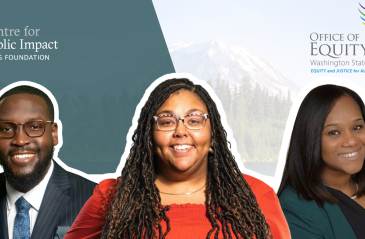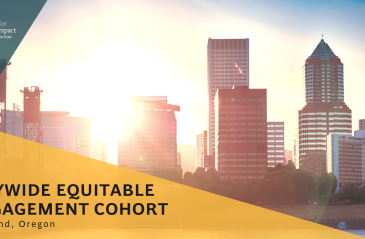
Five things we recently learned about difficult conversations

Citizens’ juries can help resolve the big policy challenges, says @julietmellor #FindingLegitimacy
Share articleJury deliberation can lead to better political decisions and better policy #FindingLegitimacy
Share articleCitizens’ juries could help bridge the gap between politicians and public #FindingLegitimacy
Share articleWe put our vision for government into practice through learning partner projects that align with our values and help reimagine government so that it works for everyone.
Some of us have been there. The post arrives and, amid the usual assortment, there is a letter summoning you to jury service. It's part and parcel of society. And so entrenched has it become that, even if inconvenient, few quibble when it is their turn to serve.
But imagine if juries didn't only render their judgment on matters of law and order. What if they were also deployed to weigh in on the pressing issues of the day? In doing so, they would help governments navigate the tricky policymaking landscape and play a key role in strengthening their legitimacy. Sounds like a pipedream? Actually, they are already up and running in countries such as Australia and Canada, and they have also found powerful advocates in the UK in people like Dame Julie Mellor, a 40-year veteran of the public and private sectors.
It turns out that her passionate support is rooted in her experiences of the past four decades. “I've learned that if you don't engage people in the process, you actually don't know what will work best,” she explains. “Citizens' juries, though, can help resolve the great challenges of our time, like drug regulation and social care reform. Jury deliberation can lead to better political decisions, better policy and greater legitimacy for the politicians involved. Who can argue with that - especially in this day and age?”
As Mellor, with colleague Adam Hawksbee of the Harvard Kennedy School, develops ideas for citizens' juries in the UK, she is keen to hear what others across the globe think are critical to their success in strengthening democracy and resolving major policy challenges.
There are three key elements to a citizens' jury. Firstly, it is commissioned by a politician or group of politicians. Secondly, it has to be a random and representative sample of the public - just like a courtroom jury. And thirdly, it has to be provided with evidence and expert witnesses of different opinions.
The jury also needs to come to a consensus - not a “yes” or “no”. This, Mellor believes, is vital. “Juries need to come up with a consensus viewpoint on what is important when politicians have to take decisions on difficult issues requiring tradeoffs,” she says. “Juries are not direct democracy, because they're not taking a decision. And they're not consultation, because consultation means taking a variety of views. The key here is that they have to come to consensus. It's not a focus group, but rather a way for politicians to make better and more legitimate political decisions.”
Mellor now chairs the innovation research institute, The Young Foundation, but hers has been a distinguished and eclectic career. She has had stints at the Equal Opportunities Commission, served as a partner with PwC, and chaired the Ombudsman Services for UK-wide public services and the NHS in England. She is now using the knowledge accrued from such leadership roles to promote greater use of citizens' juries - but she is keen to stress that her ideas are not set in stone.
“I've come up with five factors which, I think, help give juries the best chance of success, but I'm sure others out there have their own ideas and I'd like to hear from them.” Asked to list the five, she starts by pointing out that timing is critical.
“It is important to commission the juries early in the decision-making process,” she says. “If you do it late, when political views are entrenched and the debate has become more toxic, then it all becomes far harder. Better, then, to use citizen juries at the start of policy development on complex issues and before viewpoints become too deeply rooted.”
The second is for juries to tackle only those complex issues involving tradeoffs, and where politicians would really benefit from knowing the public's perspective. “And the third is the organisational form,” she continues. “Although juries should be commissioned by politicians, the organisations designing and delivering the juries have to be independent and impartial.
“The fourth is publicity. These are most likely to catch on and become part of democracy if we can build momentum through involving the media before, during and after. And the fifth is cost. Face-to-face juries are very expensive to do, so we need to look at doing this in a more frugal way, probably by combining face-to-face methods with online deliberation, so you get a wider number of people involved.”
On the face of it, citizens' juries seem like an excellent way of involving the public in decision-making and helping counter some of the forces that have propelled the current crisis of legitimacy facing many governments worldwide. Somewhat surprisingly, however, they are yet to take off at scale - in the UK at least.
“Claudia Chwalisz recently outlined how they are being used in Australia and Canada, but here in the UK it has been far slower,” concedes Mellor. “NESTA will soon be doing some research on identifying the barriers to citizens' juries becoming more widely used, and hopefully we can learn from that. The research will hopefully give us a method to go at scale, but until we have it we don't know if there are sufficient drivers for change.”
Mellor, though, is far from downhearted at this temporary impasse. In part, this is because of the success of such juries in other countries, but also because of her own experiences and the importance she attaches to both listening and learning.
“When I was at the Equal Opportunities Commission, I remember staff saying that ‘Julie made us go out and listen to people',” she recalls, laughing. “But for me it's almost a process of mutual education - we knew about the legislation and political theories about equality - but what we ended up designing was so much more enriched from hearing about the values and motivations of the public.”
It was a similar story at the Ombudsman Services. “We found that what the public wanted when they made a complaint about a public service was not only for things to be put right for them but also to prevent what happened to them from happening to other people,” she says. “So it was out of a sense of public duty that they were complaining. As a result, we decided to investigate more of the cases that came to us, so we could see the trends and patterns in public service failures and take those to parliament, who would hold government to account for learning from their mistakes and improving services for all.”
As CPI has discovered with our Finding Legitimacy research programme, governments should gratefully receive any attempt or method to connect them with the needs and aspirations of the public. Mellor, too, agrees that the wider political context has made the need more urgent.
“Faced with slow and uneven economic recovery, increasing migration and geopolitical security challenges, alongside long-term social and economic changes to our societies, communities feel insecure, anxious and suspicious,” she says. “It is these feelings that have led to a pervasive and unsettling crisis of trust and legitimacy for our political institutions.”
She goes on to say that this is exemplified by a surge in support for populist and nationalist movements where people seek scapegoats - others they can blame for their problems and anxieties. “People are looking for simple explanations and easy solutions to complex problems,” she says. “This makes it incredibly hard for politicians to gain legitimacy for making hard choices about the use of scarce resources or the balancing of competing objectives.”
Citizens' juries could be part of bridging the gap between politicians and the public: the public better understand the issues and constraints behind the choices politicians must make; politicians better understand the values and motivations that the public apply to those hard choices. “Citizens' juries can support politicians in moving forward and making decisions on the big and long-term issues we face,” concludes Mellor. “They can be part of forging a new and positive vision for how we make political decisions in the UK city regions, in each nation's assembly or parliament, in the Westminster parliament, and in UK-wide government.”
While only time will tell if citizens' juries take root as a core aspect of democracy and government, Mellor will be using the NESTA research findings to determine next steps in the UK. Both Mellor's track record and the pressing wider issue of legitimacy lead one to suspect that her current pause is very much temporary. Watch this space…
If you would like to contact Julie about citizens' juries and the five factors she thinks give them the best chance of success, please contact her via Twitter: @julietmellor
What is legitimacy to you? Where do you see legitimacy working well? How governments work with communities to build legitimacy is a big question for CPI.
Find out how to get involved in our Finding Legitimacy project
Finding legitimacy - CPI is starting a global conversation for better outcomes. Nadine Smith introduces a new research programme about legitimacy from the Centre for Public Impact.
Why you cannot fix legitimacy but you can mend it. How can governments reconnect with their communities? Nadine Smith explains why there is is no catch-all fix but instead a continuous journey of improvement
If no news is good news, what is fake news? With fake news increasingly part of the public discourse, Nadine Smith examines how governments can start to strengthen its own credibility rating.
Public impact in a post-truth world. Governments have struggled for years to understand that people's perceptions of life are very often their reality, says Adrian Brown, who suggests that “post-truth” can simply mean “truth” from a different vantage point
Why we shouldn't panic over post-truth. Nadine Smith explains why policymakers should understand how to adapt messages so that people feel connected to them.
In conversation with… Ben Page. Ben Page, chief executive of leading market research company Ipsos MORI, sits down with CPI's executive director, Adrian Brown, to discuss the tumultuous events of 2016, and the causes and impact of greater unpredictability and disruption on the political scene.
Recognising and renewing governments' legitimacy. Preserving their legitimacy in such a fast-changing world should be a priority for governments the world over, says Maryantonett Flumian.
Building trust and legitimacy through innovation in Mexico. Mexico's Director of Public Innovation, Enrique Zapata, talks legitimacy, impact and improved women's health.











